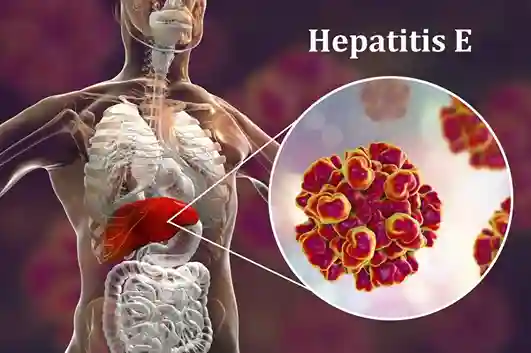Hepatitis E
Hepatitis E is a type of hepatitis that causes inflammation and damage to the liver. The hepatitis E virus that causes it has different strains that spread in different ways.
Some types of viruses are spread by drinking contaminated water, while others are spread through undercooked meat.
Hepatitis E usually causes an acute, or short-term, infection. In most cases, the body recovers and fights off the infection and the virus goes away. People with acute hepatitis E usually get better without treatment after a few weeks.
However, hepatitis E can also occur in a chronic or long-term form. This usually occurs when the body is unable to fight the virus, so the virus does not disappear from the body.
Chronic hepatitis E is rare and occurs only in people with weakened immune systems. For example, hepatitis E can become chronic in people who take medications that weaken the immune system, such as after an organ transplant, or in people with HIV/AIDS.
Symptoms of Hepatitis E
In general, HEV symptoms appear about 2–7 weeks after exposure to the virus, and usually last for about 2 months. Here are common symptoms of hepatitis E:
- Yellowing of the skin and eyes.
- Urine is dark in color like tea.
- Joint and abdominal pain.
- Loss of appetite.
- Liver swelling.
- Acute liver failure.
- Nausea and vomiting.
- Often feel tired.
- Fever.
Causes of Hepatitis E
Infection and symptoms of hepatitis E are caused by HEV (Hepatitis E Virus). This virus can be transmitted through food or water that has been contaminated by the feces of someone with hepatitis E.
In addition to food and drink, hepatitis E transmission can also occur through blood transfusions, between mother and fetus if the mother is infected, and unprotected sex. If someone is infected with hepatitis E, the person will experience an acute liver infection.
Hepatitis E Risk Factors
Hepatitis can affect anyone, but there are various factors that increase the risk that make someone more susceptible to the hepatitis E virus, including:
- Poor personal hygiene.
- The hepatitis E virus enters the feces during bowel movements.
- Having sex without using a condom and changing partners.
- Living with someone who has chronic HEV (hepatitis E) infection.
- Traveling to areas with high rates of HEV infection.
Diagnosis of Hepatitis E
Hepatitis E can be diagnosed with a blood test. The test aims to detect the presence of the hepatitis virus in the body and whether the body has antibodies to the virus.
The test can help doctors start treatment and recommend lifestyle changes for hepatitis E sufferers to slow down the process of liver damage.
Hepatitis E Treatment
Treatment for acute hepatitis E is rest, drinking plenty of fluids, and eating a healthy diet to help relieve symptoms. Talk to your doctor before taking any medications or vitamins.
People with hepatitis E should also avoid alcohol until their doctor says they have completely recovered from hepatitis E. See your doctor regularly to make sure your body has fully recovered.
Meanwhile, chronic hepatitis E may require medication. Doctors can treat chronic hepatitis E with ribavirin or peginterferon alfa-2a. Further, it can be discussed with the doctor.
Complications of Hepatitis E
Most people recover from acute hepatitis E without complications. In some cases, acute hepatitis E can lead to acute liver failure, a condition in which the liver fails suddenly.
Acute liver failure due to hepatitis E is more common in pregnant women or people with other liver diseases. In pregnant women, hepatitis E can cause other complications for the mother and baby. Examples include stillbirth, premature birth, or low birth weight. Meanwhile, chronic hepatitis E can cause complications such as cirrhosis or liver failure.
Prevention of Hepatitis E
Hepatitis E can be prevented by paying attention to personal and environmental hygiene. For example, by not consuming dirty water and raw food. This includes consuming fruits, vegetables, and shellfish. Although unprocessed, these foods must be consumed in a clean state, namely by rinsing them with water.
Also, make sure to always consume clean drinking water (purified water or boiled water). Always make washing your hands with soap a part of your daily habits, especially after going to the toilet, before and after preparing food, and before and after eating.

